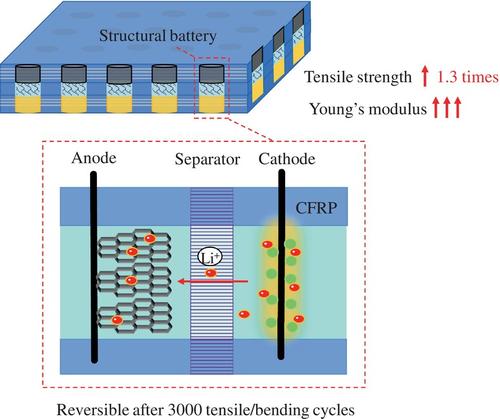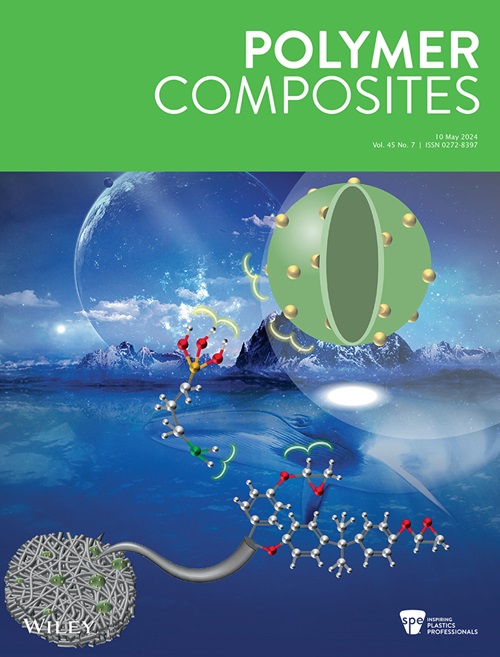协调集成机械和电气功能的多孔结构电池复合材料
IF 4.7
2区 材料科学
Q2 MATERIALS SCIENCE, COMPOSITES
引用次数: 0
摘要
结构电池复合材料(SBC)是一种新兴的多功能技术,其中具有储能功能的材料被用于制造承重结构组件。然而,由于结构电池电解液(SBE)中的液态电解质污染以及活性电池材料的体积膨胀较大,多层结构电池复合材料的层间界面不佳,往往给实际应用带来困难。本研究设计并制造了一种新型多孔磷酸铁锂-石墨 SBC,将电池材料和树脂基体以图案晶格的形式独立分布在碳纤维织物上,制备电极预浸料。固化后的多孔复合材料框架既能支持承重功能,又能限制晶格内液态电解质的电化学反应。经过 3000 次半径小至 10 毫米的弯曲循环后,电极显示出可逆的电阻。与液固双相混合 SBE 结构相比,其机械性能明显提高,抗拉强度达到 486.1 兆帕,杨氏模量为 9.1 GPa。SBC 在 0.1C 时的容量也达到了 27.8 mAh/g。这种机械和电气功能的直接集成途径与航空航天复合结构的制造工艺相兼容,将为分布式电子设备提供高效便捷的能源供应解决方案。本文章由计算机程序翻译,如有差异,请以英文原文为准。

Porous structural battery composite for coordinated integration of mechanical and electrical functionalities
Structural battery composites (SBCs) represent an emerging multifunctional technology in which materials functionalized with energy storage capabilities are used to build load-bearing structural components. However, due to the liquid electrolyte contamination in structural battery electrolyte (SBE) and the large volume expansion of active battery materials, the poor interlayer interfacial in multilayer SBCs often causes difficulties in practical use. In this study, a new porous LiFePO4-graphite SBC is designed and fabricated by independently distributing battery materials and resin matrix on carbon fiber fabric in pattern lattice form to prepare electrodes prepreg. The cured porous composite framework supports the load-bearing function while limiting the electrochemical reaction in liquid electrolyte within lattices. The electrodes show reversible electric resistance after 3000 bending cycles with radius as small as 10 mm. The mechanical properties enhance significantly with tensile strength of 486.1 MPa and Young's modulus of 9.1 GPa compared to that with a liquid–solid biphasic mixed SBE structure. The SBC also exhibits a favorable capacity of 27.8 mAh/g at 0.1C. This straightforward integration path of mechanical and electrical functionalities is compatible with the manufacturing process of aerospace composite structures, which will provide an efficient and convenient energy supply solution for distributed electronics.
求助全文
通过发布文献求助,成功后即可免费获取论文全文。
去求助
来源期刊

Polymer Composites
工程技术-材料科学:复合
CiteScore
7.50
自引率
32.70%
发文量
673
审稿时长
3.1 months
期刊介绍:
Polymer Composites is the engineering and scientific journal serving the fields of reinforced plastics and polymer composites including research, production, processing, and applications. PC brings you the details of developments in this rapidly expanding area of technology long before they are commercial realities.
 求助内容:
求助内容: 应助结果提醒方式:
应助结果提醒方式:


